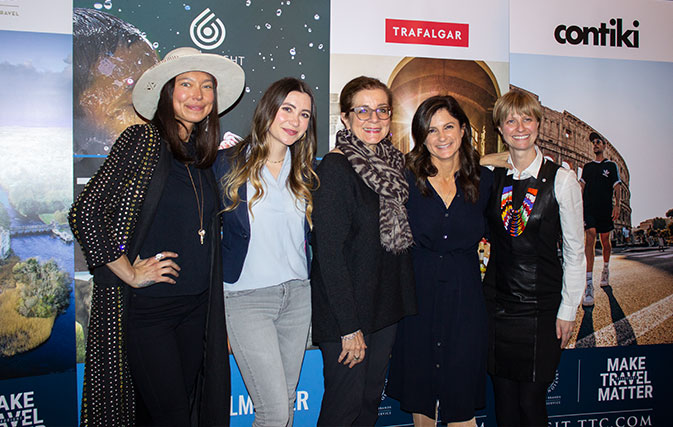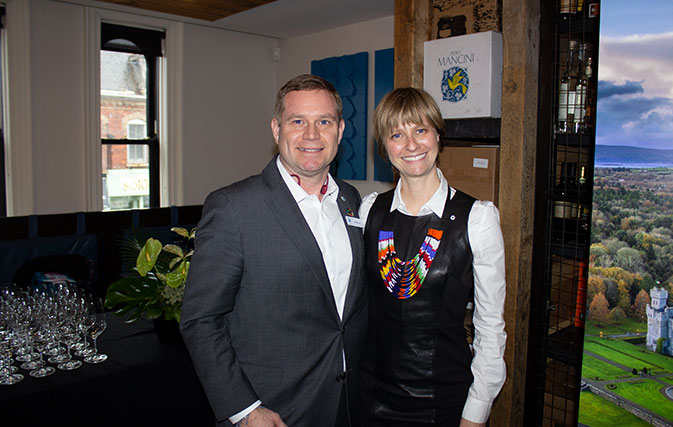TORONTO — We should all be so lucky to view our jobs the way Roxanne Joyal does. As CEO and co-founder of ME to WE, the Toronto-based social enterprise, Joyal considers it not so much as a job but a lifestyle, one that has not only transformed her own life but the lives of those she works with.
The impassioned leader was one of five fearless females who were honoured at a special luncheon yesterday in celebration of International Women’s Week. Hosted by The Travel Corporation (TTC) and taking place in Toronto, the event was a chance for the five women – four of whom serve as global ambassadors for TTC’s brands, and all regarded as trailblazers in their respective industries – to tell their stories and shine the spotlight on women in travel today.
Joining Joyal on the stage were: Patricia Schultz, NY Times best-selling author of ‘1000 Places to See Before you Die’; Sarain Fox, indigenous activist and storyteller; Nadine Sykora, travel vlogger and YouTuber; and Ami Vitale, National Geographic photographer and filmmaker.

From l-r: Sarain Fox, Indigenous activist and TreadRight’s ‘People’ Ambassador & Storyteller; Nadine Sykora, travel vlogger and honourary Contiki Ambassador; Patricia Schultz, best-selling author and Trafalgar Global Brand Ambassador; Ami Vitale, award-winning National Geographic photographer, filmmaker and TreadRight’s Wildlife Ambassador; and Roxanne Joyal
The fact that TTC has such a diverse and impressive lineup of female ambassadors should come as no surprise; 71% of the company is comprised of women, 50% of whom are in executive leadership roles. Its industry-leading stance on gender equality and female empowerment impacts everything it does, from the people it works with to the tours it offers around the world.
“We are so proud to support women globally and we’re empowered by a 100% global senior team and travel experience team that are all women,” said Julia Wong, Marketing Manager for Insight Vacations Canada, part of The Travel Corporation family. “Our itineraries will continue to be enhanced and created with women’s interests and preferences in mind.”
Insight has just debuted its new ‘Wander Women’ program comprising women’s only journeys, with India launching as a new destination this week. Departing March 2021 with an average group size of 32 passengers, the 12-day ‘Inspirational India, A Wander Women Journey’ is run and designed by women and includes female-geared activities, plus visits to women-led organizations that support the lives of local women.
“There has been a definite increase in demand for women’s only journeys,” adds Wong, who also notes that 57% of Insight’s guests are women. “We are meeting this demand by paying close attention to our guests’ feedback and offering them the immersive experiences that will make their journeys memorable and meaningful. We’ll also likely start seeing an increase in solo female travellers even further as they can join our journeys and feel comfortable enough to travel alone, while meeting like-minded women to create meaningful friendships with long term.”
Though empowering female travellers is essential to uplifting women around the world, equally important is empowering the women in communities travellers visit. It’s organizations like ME to WE that are leading the movement to do just that, by creating socially responsible experiences and products. Its mission is two-fold: to create employment and economic empowerment for over 2,000 people in WE Village communities around the world via artisanal products and global service trips, and to donate a minimum of 50% of profits to its WE Charity, with the balance of funds being reinvested into its social enterprise division. Since 2009, ME to WE has donated $20 million in cash and cost offsetting in-kind donations to the charity.
Now in its 25th year, the organization also operates three purpose-built lodges around the world – in the Ecuadorian Amazon, on the edge of Masai Mara in Kenya, and another in the Aravalli mountain range in Rajasthan, India – and is now in its fourth year of its global partnership with TTC, through which travellers can add on ME to WE extensions to their itineraries.
“It’s our belief that people want to be able to vote for change with their wallets and align their purchasing with their values, and so ME to WE is able to provide consumers with the opportunity to take socially responsible trips and also purchase socially responsible items that ultimately give back to communities from where these experiences and products are sourced,” Joyal tells Travelweek. “It’s through enterprise that we’ve been able to literally connect women to global market.”
The building blocks of ME to WE were first laid 25 years ago when Joyal took her first trip overseas. She found herself in Kenya working and volunteering on a 100,000-acre wildlife conservation ranch where she eventually was tasked to build a small gift shop that sold locally-made products. It was here where she first saw the challenges – and the opportunities – women had while living in poverty.
“I really wanted to harness and leverage the skills that they had to be able to earn an income,” she says. “This really became the predecessor for what we do today with ME to WE Artisans.”
Beginning in 2010 with a group of just 20 women, ME to WE Artisans has grown exponentially to now include a roster of 1,600 women, full time, in the Masai Mara. Through the program, these women are able to translate their beading skills to create products – like the hero Rafiki bracelet – that are relevant and sold throughout North America.
When asked why invest in women in particular, Joyal is quick to point out the long-lasting impact it has on not just the women themselves, but to all those around them.
“It’s well known that every dollar invested in a woman is a dollar that then goes to her household, to her kids and to her community. That in itself – providing employment opportunity for women – is a huge lifter for the entire community,” she says.
Joyal is reminded of the stories of women who, after just a short time earning income through the artisan program, were welcomed home in grand gesture by their husbands.
“We were hearing that men who, given the historical reality in Kenya often considered women as a ‘burden’, were suddenly opening the door and saying ‘Welcome home, Wife’. And what’s really important also is that their children, both boys and girls, are seeing their mothers be empowered. That’s also going to change the dialogue between genders as they grow up,” she says. “The biggest change, I would say, is intergenerational, which gives me the goosebumps.”
Looking ahead, Joyal is encouraged by what companies like TTC are doing to advance female leadership and empowerment. Noting the importance of having women in leading roles (“they bring incredible gifts like clarity and understanding of work and family balance”), it is Joyal’s hope that women continue to excel in the travel industry.
“We’ve been very fortunate in our partnership with TTC,” she adds. “When you consider that the president of Contiki and Uniworld are women, and of course the Tollman family themselves, all of whom have travelled with us to our destinations overseas, TTC has been incredibly generous and inclusive. They are a force to be reckoned with.”

